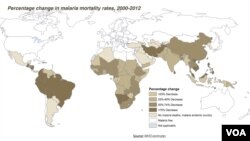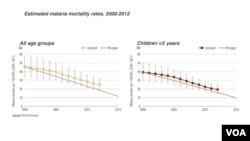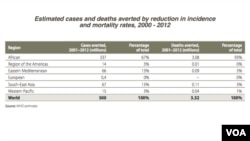The global effort to curb malaria is succeeding phenomenally, according to the latest report from the World Health Organization. More than three million lives have been saved so far this century with better prevention and better medicines. The organization expects even more success.
Global efforts to end malaria and the human suffering it causes have made huge strides since 2000. Public and private donors have targeted hard hit countries by funding programs like the one in Kenya.
The World Health Organization's latest report on malaria says three million lives, mostly those of children, have been spared. The death rate has been cut by nearly half.
Dr. Robert Newman, who heads the organization's global malaria program, said, "There’s been a large increase over the last 12 years in financing for malaria control efforts, and that has purchased lifesaving commodities like long-lasting insecticide treated bed nets, insecticides for indoor spraying, diagnostic tests, especially rapid diagnostic tests, and anti-malarial medicines.”
Malaria is a plague in more than 100 countries, mostly in sub-Saharan Africa, Latin America and Asia.
Dr. Newman expects the number of deaths from malaria to drop even more over the next 10 years.
"I think we are going to see an incredible decade of success ahead, especially as people realize that this is a proven public health investment and that we have millions of more lives that can be saved over the next 10 years," he said.
Newman predicts a vaccine will be ready within 20 years and cut the number of cases by 75 percent.
Experts say without malaria, productivity will increase. People will be better able to provide food for their families, and they can put the money they normally use to buy anti-malarial drugs toward other uses. Countries can focus on other health needs.
Dr. Joy Phumaphi, who works with the African Leaders Malaria Alliance, said, "Once you don’t have children’s wards in hospitals dominated by children suffering from malaria, as you do in many of the endemic countries, you are going to free up a lot of resources that are going to combat the other diseases that are challenging our communities."
Challenges in the fight against malaria include a growing resistance to anti-malarial drugs and insecticides. But Dr. Newman said there's an even bigger threat. "The most serious threat to malaria control and ultimate elimination is actually a financial one."
The U.N. Children's Fund and other organizations supply bed nets, one of the main protections against mosquitos that carry the malaria parasite. Agencies that offer help to prevent and treat malaria say they have only half the funds they need.
Without that money, the groups warn, gains will be reversed.
Global efforts to end malaria and the human suffering it causes have made huge strides since 2000. Public and private donors have targeted hard hit countries by funding programs like the one in Kenya.
The World Health Organization's latest report on malaria says three million lives, mostly those of children, have been spared. The death rate has been cut by nearly half.
Dr. Robert Newman, who heads the organization's global malaria program, said, "There’s been a large increase over the last 12 years in financing for malaria control efforts, and that has purchased lifesaving commodities like long-lasting insecticide treated bed nets, insecticides for indoor spraying, diagnostic tests, especially rapid diagnostic tests, and anti-malarial medicines.”
Malaria is a plague in more than 100 countries, mostly in sub-Saharan Africa, Latin America and Asia.
Dr. Newman expects the number of deaths from malaria to drop even more over the next 10 years.
"I think we are going to see an incredible decade of success ahead, especially as people realize that this is a proven public health investment and that we have millions of more lives that can be saved over the next 10 years," he said.
Newman predicts a vaccine will be ready within 20 years and cut the number of cases by 75 percent.
Experts say without malaria, productivity will increase. People will be better able to provide food for their families, and they can put the money they normally use to buy anti-malarial drugs toward other uses. Countries can focus on other health needs.
Dr. Joy Phumaphi, who works with the African Leaders Malaria Alliance, said, "Once you don’t have children’s wards in hospitals dominated by children suffering from malaria, as you do in many of the endemic countries, you are going to free up a lot of resources that are going to combat the other diseases that are challenging our communities."
Challenges in the fight against malaria include a growing resistance to anti-malarial drugs and insecticides. But Dr. Newman said there's an even bigger threat. "The most serious threat to malaria control and ultimate elimination is actually a financial one."
The U.N. Children's Fund and other organizations supply bed nets, one of the main protections against mosquitos that carry the malaria parasite. Agencies that offer help to prevent and treat malaria say they have only half the funds they need.
Without that money, the groups warn, gains will be reversed.








